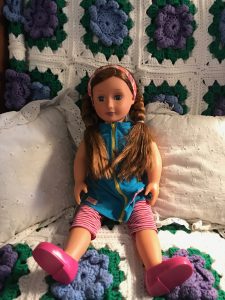Many of us grew up with emotional, sexual, or physical abuse. Did you? You may not have experienced overt abuse, but maybe you were raised by one or more parents who put themselves and their needs before yours. The Diagnostic and Statistical Manual of Mental Disorders (DSM-5),* published by the American Psychiatric Association, gives the following criteria for someone with narcissistic personality disorder:
- Having an exaggerated sense of self-importance.
- Expecting to be recognized as superior even without achievements that warrant it.
- Exaggerating achievements and talent.
- Being preoccupied with fantasies about success, power, brilliance, beauty, or the perfect mate.
- Believing they are superior and can only be understood by or associate with equally special people.
- Requiring constant admiration.
- Having a sense of entitlement or expecting special favors and unquestioning compliance with their expectations.
- Taking advantage of others to get what they want.
- Having an inability or unwillingness to recognize the needs and feelings of others.
- Being envious of others and believing others envy them.
- Behaving in an arrogant or haughty manner.
Your parents may have had some narcissistic tendencies, but would not be considered to have narcissistic personality disorder. As with many psychological issues, there is a continuum. Some people would be at the mild end and others at the personality-disordered end of the continuum.
Growing up with a parent who falls anywhere on this continuum can be difficult and painful.  Tweet This
Tweet This
Both mothers or fathers can be narcissistic. To simplify matters, I will use the example of a narcissistic mother. According to Dr. Karyl McBride, in her book, Will I Ever Be Good Enough? Healing the Daughters of Narcissistic Mothers,** if you grew up with a narcissistic mother, you may have realized at some point in your childhood, or early adulthood, that your life was less important to her than her life. In fact, she hardly saw you as a separate person. To her, you were just an appendage, sort of like another arm. Because of this, if you did something she didn’t like, she would become angry with you, because, after all, an arm should do the bidding of the person who owns it, right? Perhaps she wouldn’t show her anger, but would make you pay for it somehow. Maybe she would make you feel guilty for “hurting her,” or blame you for being wrong, or berate you for being stupid, cruel, arrogant, or any number of negative characteristics. She had no empathy for your feelings and didn’t really acknowledge you had needs of your own. You were primarily put on earth to serve her.
How might this have affected you?
- You grew up without the unconditional love all children crave.
- You were made to feel you had to earn love, affection.
- When you were a child, you took care of your mom, at least emotionally, instead of her taking care of you.
- You acted like your mom’s friend instead of her child; therefore, you knew things about her life a child shouldn’t know. For example, she told you personal information about her relationship with your father.
- As an adult, you walk on eggshells around her, trying not to upset her, or draw attention to yourself, your needs, or your accomplishments.
- You might still take responsibility for your mom’s emotional state, such as changing your behavior around her to keep her happy.
- Even as an adult you apologize for things that aren’t your fault or aren’t in your control.
- You have an ongoing internal monologue that says, “I need to . . .” or, “I should . . .” or, “I have to . . .”
- You are very hard on yourself when you are not able to perform a role or task perfectly.
Healing from a childhood with a narcissistic mother will take time, and will sometimes cause you pain. In my book, A Journey to Healing After Emotional Abuse, I list five steps to healing from being raised by a narcissist. I will share the first two here, and the next three next week. As part of the steps, I recommend you write in a journal. Many people hate the idea of writing – it reminds us of our school days. You can relax. Journal writing is just for you. You can type it or write it, and you don’t need to use your best handwriting! Spelling and grammar don’t matter – this is for your eyes only. You don’t need to purchase a fancy journal, stapling loose leaf papers together works just fine, as does creating a file on the computer.
Step One: Accept Your Mother’s Limitations
Regardless of whether your mother is still in your life, you will need to mourn the loss of your ideal mother. Don’t deny the pain of living with a narcissistic mother. Write in your journal what an ideal mother would have been for you. Then, write what growing up with your mother truly was like. Be honest with yourself about what you have lost by having a mother who cared more for her needs than yours.
Perhaps the idea that your mother was incapable of real love and empathy is shocking to you. Maybe you feel guilty for even considering the idea. Here is an example that might help you think about this without guilt: a music tutor hands a four-year-old a violin and expects her to play a Mozart concerto. The tutor might feel disappointed, angry, and shamed she cannot teach the child to play the concerto, until she realizes the student is incapable of the task. Like the child in this example, most narcissists are incapable of giving authentic love and empathy.
Once you accept that your own mother had, or has, this limited capacity, you will be on the road to healing the pain you’ve experienced in your childhood. Tweet This
Tweet This
Step Two: Process Your Feelings
This can be a painful step, and you might be tempted to skip it. If you do, the following steps won’t work.
In this step, I advise you to mourn the loss of your ideal of a perfect, loving, caring mother. All children deserve a mother (or father) who loves them unconditionally, thinks they are the most special child in the world, and would give up anything for them. This is the way God designed families to work. Your mother was unable to love you fully because something was broken inside her, not because something was wrong with you. She may have been a victim of her own childhood abuse or experienced trauma she was unable or unwilling to process. Take the time to be honest about your feelings of anger, sadness, and loss.
You don’t have to do the following therapy, but I believe it can really help you process your negative feelings, and begin to heal your heart.
Doll Therapy
Use your journal for this exercise.
I recommend what Dr. McBride calls “doll therapy.” I tried it, and I loved it. Go shopping and find a doll that looks like you did between the ages of three and eight. Here is a picture of my doll.
Make sure you love the doll you choose. Bring her*** home and spend time talking to her. Put her on your bed, favorite chair, or couch, wherever you will see her often. Begin to mother her. Give her the love and attention you didn’t get from your own mother. Ask her what she needs from you now.
Write in your journal the things that come to mind. Begin at a young age, and slowly “grow her up.” Ask her what she missed out on in her preschool, elementary, middle school, high school, and even young adult years. Perhaps you wish your mother had been emotionally there for you when friends were mean to you in middle school, when you had your first boyfriend, decided what to do after high school, and birthed your first child.
I enjoyed “mothering myself” in this way. I kept my doll on a chair I sit in to spend time with Jesus every morning. One morning, I saw a sticky note (in my second husband’s handwriting!) that said, “What a wonderful little girl you are, so smart and funny.” A few days later, another note appeared that read, “You is kind, you is smart, you is important.” (This line is from one of my favorite movies, The Help.****) I kept those notes there for more than a year, using them to remind myself I now have unconditional love in my life.
Next week, I will describe the last three steps:
- Understanding why you have struggled to separate from your narcissistic parent
- Strengthening your inner being, and
- Empowering yourself to set boundaries with your mother.
Question: Did you have a narcissistic parent? In what ways did that affect you as a child, and how does this still affect you?
Working to heal from being raised by a narcissist can indeed be painful. You may feel worse before you begin to feel better. In Matthew 5:4 Jesus said,
Blessed are those who mourn, for they will be comforted.
I pray you will feel God’s comfort as you go through this difficult process.
Bless you,
Caroline
*American Psychiatric Association, Diagnostic and Statistical Manual of Mental Disorders (5th ed.) American Psychiatric Association, 2013.
** Karyl McBride, Will I Ever Be Good Enough? Healing the Daughters of Narcissistic Mothers (New York: Free Press, 2008), page 151.
*** For simplicity’s sake, I refer to the doll as “she.” This will work whether you are male or female.
**** Mohamed Mubarak Al Mazrouel, Tate Taylor (2011) The Help (USA: Walt Disney Pictures).





Great post, Carolyn–full of practical help.
I am so glad you found it helpful!